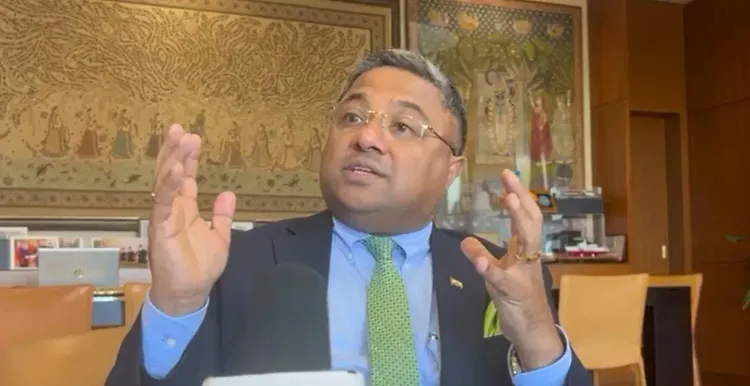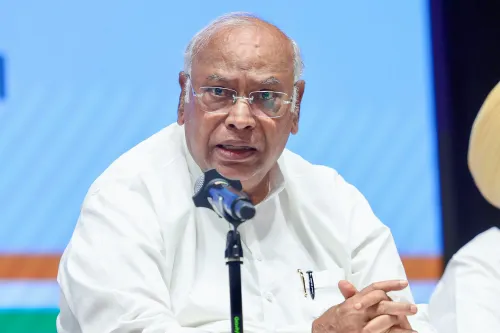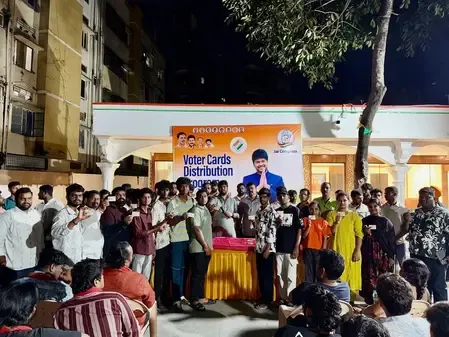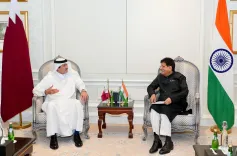Are India and Japan Natural Partners with No Limits?

Synopsis
Key Takeaways
- Strengthened Diplomatic Ties: India and Japan's relationship has evolved into a robust partnership.
- Economic Collaboration: A growing number of Japanese companies are investing in India.
- Shared Values: Both nations hold shared ideals of peace and non-violence.
- Geopolitical Strategy: The partnership is vital in addressing global challenges.
- Future Vision: A roadmap for deeper engagement is being developed.
Tokyo, Aug 20 (NationPress) In an exclusive conversation with IANS, India’s Ambassador to Japan, Sibi George, shared his insights on the strengthening ties between India and Japan, the shifting global landscape, and the influence of Prime Minister Narendra Modi’s diplomacy on India’s global stature.
Highlighting the historical connections between the two nations, the Ambassador described the bilateral relationship as a “quantum leap” in recent years, asserting that “the sky is not even the limit” for their collaboration.
Here is the complete interview:
IANS: Can India and Japan forge a powerful alliance in the new world order?
George: Since 2014, India and Japan have established what we term a Special Strategic and Global Partnership. This has reinforced the longstanding civilizational ties between our countries.
Since 2014, our relationship has steadily progressed across multiple domains: political interaction, business collaborations, defense and security cooperation, cultural exchanges, and advancements in science and technology. This progress is evident across all sectors over the past decade. In light of the current geopolitical and geoeconomic climate, we are committed to deepening our engagement on all fronts.
India and Japan are like-minded nations and natural allies, with no limits to our partnership. We are even collaborating in space exploration. The last few years have seen a significant leap forward in our relationship, and this momentum will continue.
We are devising a new roadmap and vision for our partnership—one that elevates it to unprecedented heights and encompasses all facets. This includes collaboration between Indian states and Japanese prefectures. We firmly believe that Tokyo is just a part of Japan—Japan is much larger than its capital.
Thus, engaging with every Japanese prefecture is crucial for us, and we have actively pursued this in recent years. Likewise, we are connecting Japanese prefectures with Indian states, receiving an overwhelmingly positive reaction from Japan.
IANS: How has PM Modi's diplomatic approach benefited India in challenging circumstances?
George: In recent years, India has played a pivotal role in global diplomacy. A prime example is the G20 Summit we hosted in 2023.
This summit was a significant triumph for Indian diplomacy. Concurrently, Japan hosted the G7 Summit, leading to close collaboration between our nations. Prime Minister Modi participated in the Hiroshima Summit, where we unveiled a statue of Mahatma Gandhi at the Hiroshima Peace Park.
This statue has become a symbol of India’s presence in Hiroshima. Every visitor now comes to see the Mahatma Gandhi statue, which embodies India’s commitment to peace and non-violence—values that both Mahatma Gandhi and India uphold.
The G20 Summit itself was an extraordinary occasion. We organized nearly 200 events across 50 cities in India, resulting in 200 Japanese delegations visiting during that time. Each one returned with the message that they had witnessed a ‘New India’. This was a proud moment, showcasing India’s transformation and diplomatic prowess.
IANS: What was India's most significant achievement during the G20?
George: One of the key highlights was the unanimous endorsement of a vision document, a feat that had eluded us previously. We successfully united all stakeholders to agree on a document of hope for the world.
Additionally, we provided a platform for the Global South. Prior to the G20, India hosted the Global South Summit, uniting the voices of developing nations at the G20 main table. A landmark achievement was the inclusion of Africa as a permanent member of the G20, representing over a billion people.
India, representing one-sixth of the global population, does not contribute to one-sixth of the world's problems—we bring solutions. In diplomacy, economics, and crisis management, India is consistently a provider of solutions. With 1.5 billion people living in peace and democracy, and as the nation with the largest youth population, this is the vital message India conveys today.
IANS: How has India's relationship with various countries evolved under PM Modi's leadership?
George: Our relationships with nearly every country have significantly matured. There is newfound depth and substance in our diplomatic endeavors.
For instance, Japan, a crucial partner in our Special Strategic and Global Partnership, plays a major role in our economic engagement. Currently, there are 1,500 Japanese companies operating in India, each representing a success story.
A recent survey by JETRO reveals that Japanese firms consider India their most favored expansion destination.
IANS: What makes the India-Japan economic narrative so captivating?
George: As an Ambassador, I often say that every Ambassador is essentially a salesman, and I take pride in presenting an exceptional product. The India–Japan success narrative is incredibly appealing.
India is now the world’s fourth-largest economy, offering countless opportunities for Japan to explore. This is crucial in tackling the geopolitical and geoeconomic challenges we collectively face today, and I am optimistic that we are heading in the right direction.









